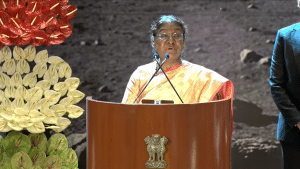July has been declared the hottest month in some say more than 100,000 years. With infernal wildfires ravaging the Mediterranean coastline, from Greek resorts popular with holidaymakers to sylvan Algerian landscape, and Antarctic ice being at its lowest levels, there isn’t any corner of the globe that is unscathed from global warming.
It rarely happens when an expression of foreboding surpasses itself, lending a more imminent sense of urgency and peril. UN chief, Antonio Gueterres’ statement about the dawn of the ‘Era of Global Boiling’ will go down as one such epoch-defining phrase.
By now, it’s become a self-reinforcing truism that global warming is a dire existential menace that needs to be timely tackled if we want to save the planet. Yet somehow, either the message doesn’t resonate hard enough, or there is some sort of complacency or wishful, abstractive thinking, or a gloom-laced fatalism.
Unlike any other juncture in history, we have technology tools and scientific solutions that enable us to monitor, observe, record, model, analyze, and then make optimum plans for better decision-making.
Surfeit of geospatial datasets and the rapidly increasing analytics capabilities due to the power of Machine Learning and AI, puts all the much-needed resources at our disposal.
Thomas Friedman’s ‘World is Flat’ chronicled the early euphoria about 21st-century globalization and the miraculous power of markets hitting its crescendo. Since then, widening disparity, the 2008 financial crash, the pandemic, the Ukraine conflict, and the rise of protectionist tendencies, have dampened the fervor.
However, the ‘flattening’ of the world courtesy Internet, GPS, Digital Maps, and Satellites thrive, even in the face of pushbacks and clamors against trade regimes or political outlooks.
High-resolution satellite imagery, 3D heat maps, change detection patterns, and the vast repository of global Earth Observation Data is the arsenal that we have to muster to mitigate climate change. Customized spatial solutions are being already used in a wide range of applications, from detecting methane emissions to making agriculture more productive.
Countries envision making National Digital Twins and tracking progress on net zero and sustainable smart transition. Certainly, there’s no shortfall where ambitious planning is concerned. But the gulf between vision and action, and the glaring disconnect between ground reality and mega blueprints, needs to be bridged.
This can’t be done without a participative, stakeholder approach that prioritizes grassroots communities, and aims to dispel skepticism and misgivings through concrete visualizations.
Climate messaging that alienates a section of the people cannot work. Preaching to the choir from August pulpits, and the evangelical zeal to institute transition without understanding the interlocking complexities, regional divergences, and the skewed symmetry in power, opportunity, and access, is a recipe for disaster.
Taking a cue from Antonio Gramsci’s famous maxim ‘Optimism of the Will, Pessimism of the Intellect’, Rebecca Solnit writes that the world cannot afford to be climate doomers.
We certainly cannot wallow in the knowledge of an inevitable wracking of Mothership Earth. But seeing that ‘things are hopeless and yet being determined to make them otherwise’, is not something easily attributable to those dwelling on the most vulnerable climate frontiers, where a host of externalities and factors collide.
The multiplicity of approaches, getting rid of reductionist frameworks, and a localized, de-centralized approach through incremental solutions, is the only way to escape this logjam.
Disclaimer: Views Expressed are Author's Own. Geospatial World May or May Not Endorse it









